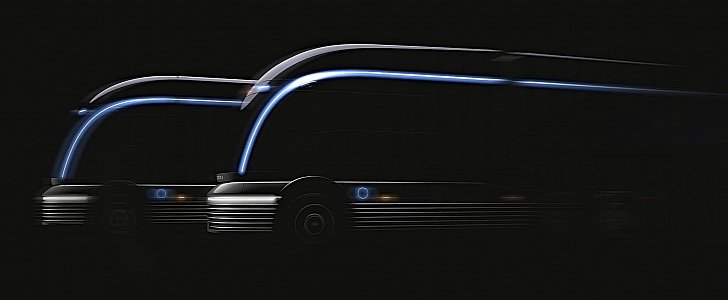As most of the players in the industry are racing toward battery-powered electrifications, some carmakers are still running the unwalked path toward fuel cell-powered cars. Hyundai is one of them, and their quest seems to continue in the years ahead as well.
Not known to many, Hyundai is making for the auto industry not only cars, but also trucks and buses. And the South Koreans have a soft spot for hydrogen fuel cell-powered such vehicles, one that will be seen in an entirely new light at this year’s North American Commercial Vehicle Show in Atlanta.
At the event Hyundai will be unveiling not one, but two goodies: the HDC-6 Neptune, a retro-styled yet futuristic concept that should eventually see the market launch of an electric truck, and a refrigerated concept trailer solution. The concept, at least, should be revolutionary.
To back its claims, the carmaker released the first two images of the concept, early renderings that are meant to bring back to mind the streamliner railway trainsets of the 1930s at the exterior, and Art-Deco styling at the interior.
That’s what Hyundai is saying, and from what we can gather from the very dark rendering of the exterior, they’re spot-on: the image shows a body curving upward from the front, with round surfaces spread all around to provide better airflow. As a statement to the car’s electric powertrain, a light band stretches the full length on the sides of the concept.
As for the chosen name, Hyundai says it has been selected in honor of the Roman god of the seas, overseer of the largest reserve of fuel for a fuel-cell car.
More details about the Neptune will be announced after the concept’s unveiling.
Despite the apparent advantages of the fuel cell technology s over the ones that rely on batteries and charging plugs - the biggest of them being the fact hydrogen cars generate their own electricity and the only byproduct is water - BEVs seem to be winning the race. Maybe more concepts such as this could tilt the balance.
At the event Hyundai will be unveiling not one, but two goodies: the HDC-6 Neptune, a retro-styled yet futuristic concept that should eventually see the market launch of an electric truck, and a refrigerated concept trailer solution. The concept, at least, should be revolutionary.
To back its claims, the carmaker released the first two images of the concept, early renderings that are meant to bring back to mind the streamliner railway trainsets of the 1930s at the exterior, and Art-Deco styling at the interior.
That’s what Hyundai is saying, and from what we can gather from the very dark rendering of the exterior, they’re spot-on: the image shows a body curving upward from the front, with round surfaces spread all around to provide better airflow. As a statement to the car’s electric powertrain, a light band stretches the full length on the sides of the concept.
As for the chosen name, Hyundai says it has been selected in honor of the Roman god of the seas, overseer of the largest reserve of fuel for a fuel-cell car.
More details about the Neptune will be announced after the concept’s unveiling.
Despite the apparent advantages of the fuel cell technology s over the ones that rely on batteries and charging plugs - the biggest of them being the fact hydrogen cars generate their own electricity and the only byproduct is water - BEVs seem to be winning the race. Maybe more concepts such as this could tilt the balance.



